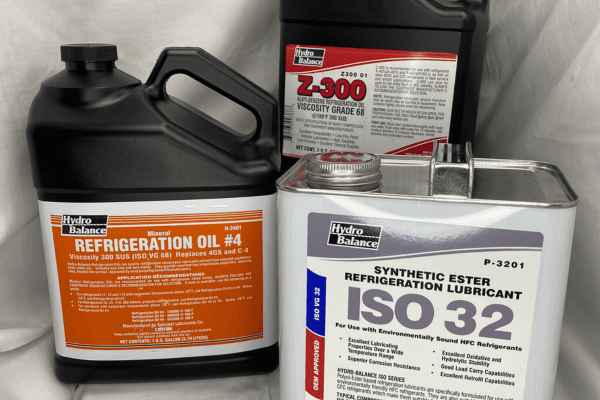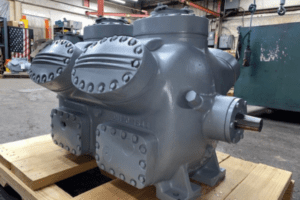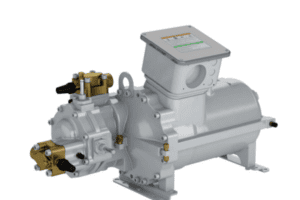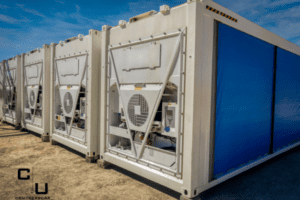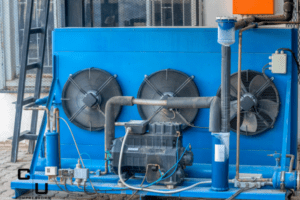Refrigeration oils are one of the “unsung heroes” of a commercial refrigeration compressor. It’s the refrigeration oil that lubricates the sliding parts within the compressor. Without adequate lubrication, or if there is to much oil in the system, damage would lead to mechanical failure in short order, but that’s not all. The right oil for the right job must also be selected.
There are four common types of refrigeration oil in use right now. As compressor manufacturers move toward more ecologically friendly refrigerants, the common kinds of refrigeration oil are also changing. That being said, even after environmental rules change, there is still time to use up your existing supply of chemicals.
Over the last few decades, compressor manufacturers have been involved in an ongoing effort to reduce the use of chemicals that could result in damage to the ozone layer and off-gassing of hazardous chemicals. There are still safety risks involved in using refrigerants and refrigerant oils, of course, but they are more manageable now.
Like refrigerants themselves, each type of refrigeration oil has a different chemical composition and needs to be stored with care under appropriate conditions to maintain its usability over time. Types of refrigeration oil a refrigeration technician usually interacts with most include alkylbenzene oil (AB) and polyolester oil (POE).
Comparing Alkylbenzene Oil (AB) and Polyolester Oil (POE)
Alkylbenzene oil is a synthetic oil that offers compatibility with both CFC and HCFC refrigerants. It is not only compatible with mineral oil but also has the added benefit of improved refrigerant miscibility whenever it’s used with R-22 refrigerant. All in all, it is the most common commercial refrigerant oil in use today.
Polyolester oil is principally synthetic and is used within systems that deploy HFC refrigerants. It is, however, broadly compatible with CFC and HCFC refrigerants as well, making it versatile and cost-effective for many different uses. Efforts are ongoing to gauge the possible uses of polyolester oils in CO2 systems as well.
Each refrigerant oil can be effective, and neither one is better than the other in all cases. Types of refrigerant oil to use in any given situation depend entirely on your use case. It’s essential to understand your system as well as the performance properties of the refrigerant oil itself and how they could affect your outcomes.
For instance, polyolester oil provides a significant boost in H20 absorption as compared to alkylbenzene oil and is regarded as superior by many commercial refrigerant experts. However, polyolester oil is typically about twice as costly in the same amounts, and does not usually produce noteworthy benefits for AB oil compatible systems.
Types of Refrigeration Oil Other than Alkylbenzene Oil and Polyolester Oil
There are some other noteworthy kinds of refrigeration oil:
Mineral oil is typically created as a byproduct of gasoline production and is the least expensive refrigerant oil. HVAC systems should never use either paraffinic mineral oils or aromatic mineral oils. However, naphthene-based mineral oils can be utilized effectively in refrigeration systems using either CFC or HCFC refrigerants.
Polyalkaline glycol is typically used only in automotive air conditioning systems that utilize R-134a.
Polyvinyl ether is a synthetic alternative to polyolester oil that has yet to see wide adoption.
Problems with Refrigerant Oil? You May Need a New Commercial Compressor
Refrigerant oil is a crucial part of keeping any commercial refrigerant system working as intended. You should check the oil as part of your regular system maintenance. In the event the oil is insufficient, there is to much oil in the system, or the wrong oil is chosen, it can lead to issues throughout the system. Ultimately, that can also result in serious compressor failures.
Remember, a commercial compressor can work harder to compensate for most other damaged parts within the system, but the opposite isn’t true. When the compressor stops working as it should, the rest of the system will follow shortly. The best thing to do is to have a plan to replace a commercial compressor before you need to.
The fastest and easiest way to replace a commercial compressor is through compressor remanufacturing.
Compressor remanufacturing ensures that, by trading in your previously used compressor core, you will be able to access a unit built on a compatible core that provides you with exactly what you need. The remanufactured unit is the same make and model as your existing compressor and can even be better than new.
Through an intensive testing process, a remanufactured commercial compressor meets all of the performance criteria and environmental commitments of a new OEM unit. In some cases, it may even exceed them. But no matter what, you can rest assured it’s ready for another eight to ten years of service or even more.
Compared to a compressor from an OEM wholesaler, a remanufactured commercial compressor gets to you far faster and is 10%, 20%, or even 30% less expensive. That makes it the ideal way to reduce your total downtime.

